qBit is a data-stealing malware that circulates in underground hacker forums. Written in Go, it evades endpoint threat detection and response systems, efficiently siphoning sensitive data from compromised systems.
Its capability to upload stolen information to a location of the attacker’s choosing makes it a potent threat. Victims face risks of identity theft, financial loss, and reputational damage due to this stealthy malware’s actions. Infections typically occur through email attachments, untrusted downloads, or malicious links, with users often falling prey to social engineering tactics like phishing.
qBit Stealer Overview
qBit Stealer is a type of malware designed for data theft from compromised systems. Created using the Go programming language, it’s currently being promoted on a hackers’ forum. This malicious software can bypass endpoint threat detection and response (EDR) systems, enabling attackers to exfiltrate stolen data to a location of their choice. This potent tool poses a significant threat to data security and privacy.
| Name | qBit |
| Threat Type | Information Stealer |
| Damage | Stolen passwords and banking information, identity theft, monetary loss, hijacked personal accounts, and more. |
| Similar Behavitor | S1deload, StealDeal |
| Fix Tool | See If Your System Has Been Affected by qBit Virus |
Technical Analysis
qBit Stealer’s impact on individuals and organizations is concerning. This malware’s primary capability is data extraction. It extends sensitive information like personal data, financial records, and login credentials. The malware’s efficiency in data theft is further exacerbated by its ability to quickly upload pilfered files to a location specified by the attacker. qBit poses a substantial threat, leading to potential identity theft, financial upheaval, and reputational damage for victims. Identity theft, in particular, can have far-reaching consequences, affecting one’s finances, credit history, and overall well-being. Rectifying the damage requires extensive efforts and resources.
Financial losses can be substantial, resulting from fraudulent transactions, unauthorized access to bank accounts, and costs associated with mitigating the breach, such as legal fees and credit monitoring services. The emotional toll of such a breach is equally significant. So, it emphasizes the need for robust cybersecurity practices and regular data backups to safeguard against such insidious threats. Furthermore, qBit’s ability to evade specific detection systems, particularly EDR solutions, makes it a challenging adversary to identify and mitigate. This stealthy nature means that victims may remain unaware of the infection until significant damage has already been inflicted. Vigilance and robust security measures are essential in combating this malicious software.
Spreading Methods
Malware infiltrates computers by opening infected email attachments, downloading files from untrusted sources, clicking on malicious links, or visiting compromised websites. Vulnerabilities in software and operating systems can also be exploited, particularly when updates are neglected. Cybercriminals employ social engineering tactics, such as phishing, to deceive users into taking actions that enable infections. Subsequently, the malware executes malicious code, providing unauthorized access to the victim’s computer.
Remove qBit with Gridinsoft Anti-Malware
We have also been using this software on our systems ever since, and it has always been successful in detecting viruses. It has blocked the most common Stealers as shown from our tests with the software, and we assure you that it can remove qBit as well as other malware hiding on your computer.
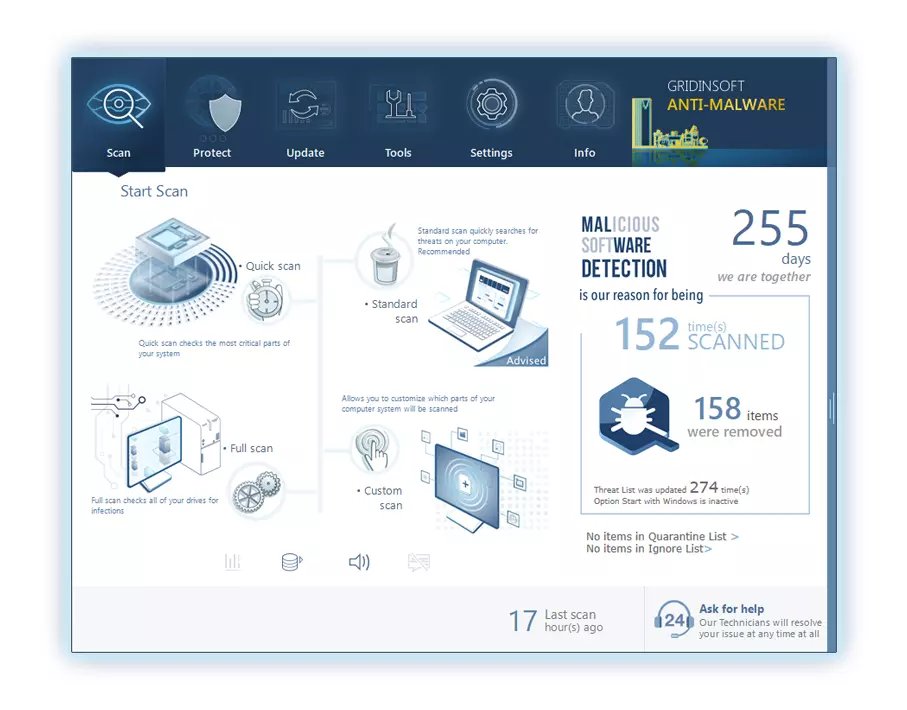
To use Gridinsoft for remove malicious threats, follow the steps below:
1. Begin by downloading Gridinsoft Anti-Malware, accessible via the blue button below or directly from the official website gridinsoft.com.
2.Once the Gridinsoft setup file (setup-gridinsoft-fix.exe) is downloaded, execute it by clicking on the file.
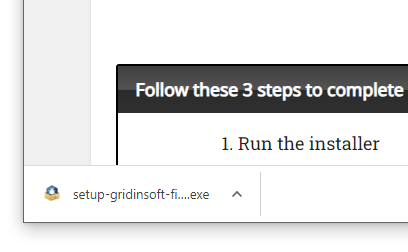
3.Follow the installation setup wizard's instructions diligently.
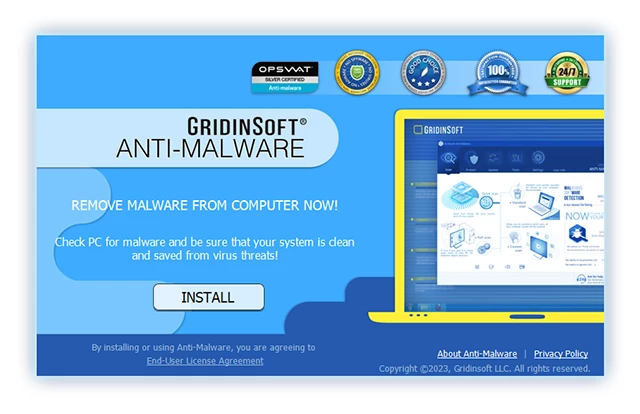
4. Access the "Scan Tab" on the application's start screen and launch a comprehensive "Full Scan" to examine your entire computer. This inclusive scan encompasses the memory, startup items, the registry, services, drivers, and all files, ensuring that it detects malware hidden in all possible locations.
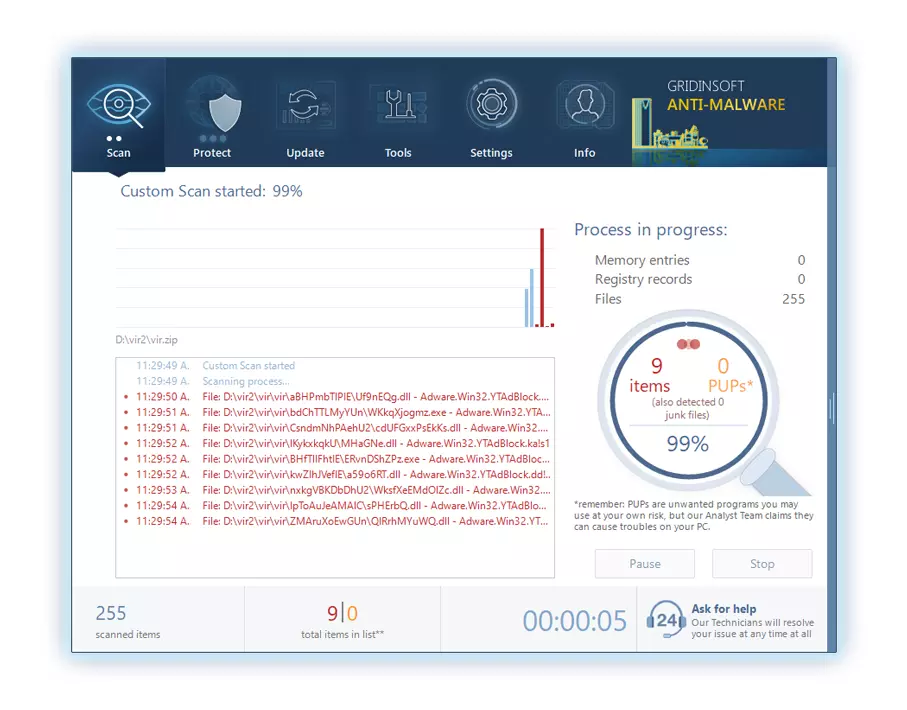
Be patient, as the scan duration depends on the number of files and your computer's hardware capabilities. Use this time to relax or attend to other tasks.
5. Upon completion, Anti-Malware will present a detailed report containing all the detected malicious items and threats on your PC.
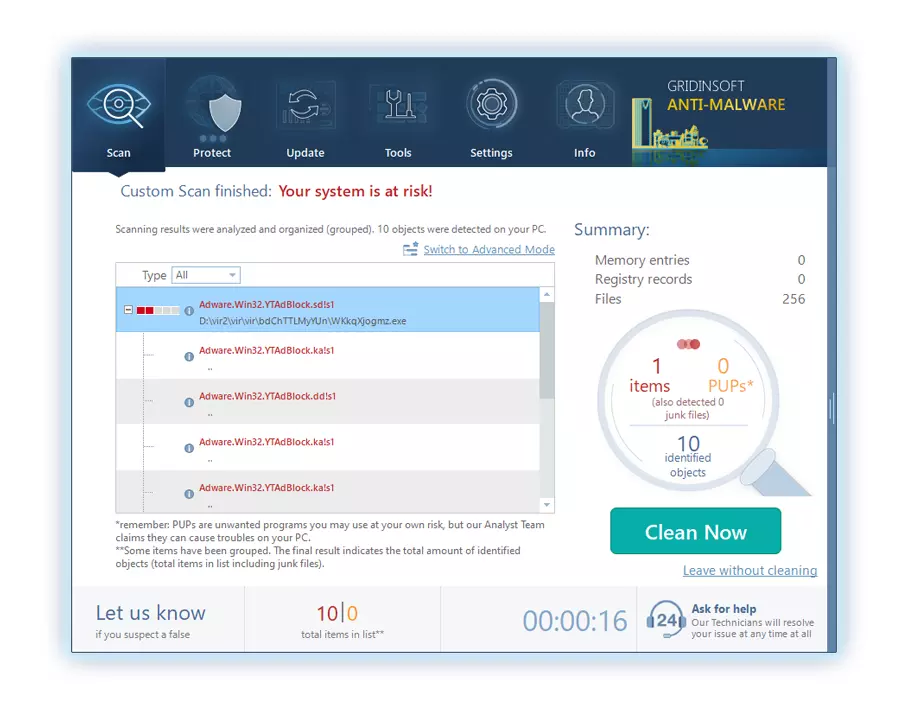
6. Select all the identified items from the report and confidently click the "Clean Now" button. This action will safely remove the malicious files from your computer, transferring them to the secure quarantine zone of the anti-malware program to prevent any further harmful actions.
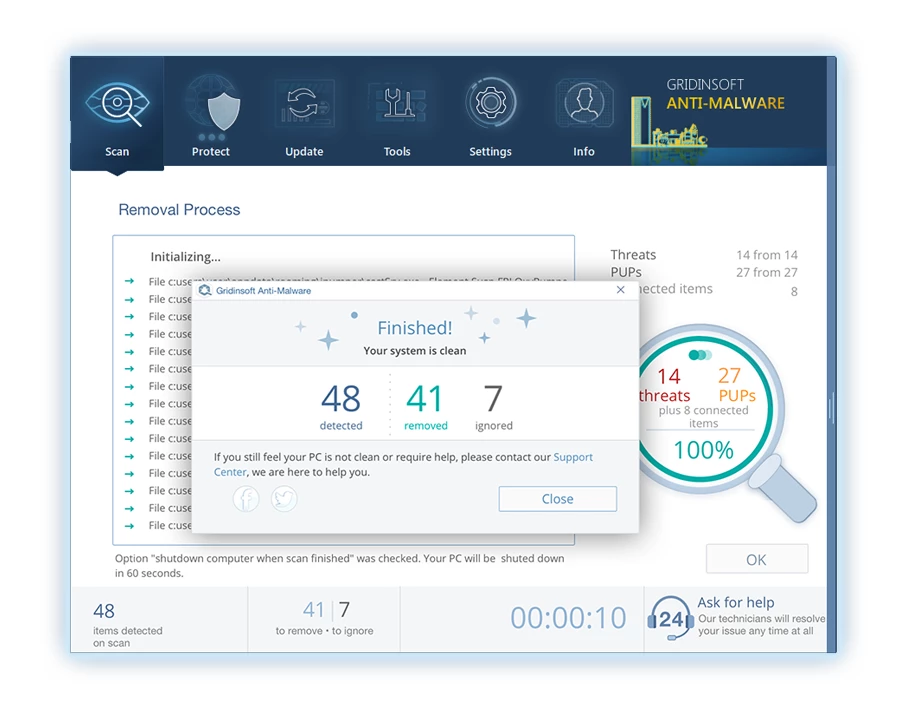
8. If prompted, restart your computer to finalize the full system scan procedure. This step is crucial to ensure thorough removal of any remaining threats. After the restart, Gridinsoft Anti-Malware will open and display a message confirming the completion of the scan.
Remember Gridinsoft offers a 6-day free trial. This means you can take advantage of the trial period at no cost to experience the full benefits of the software and prevent any future malware infections on your system. Embrace this opportunity to fortify your computer's security without any financial commitment.
Trojan Killer for “qBit” removal on locked PC
In situations where it becomes impossible to download antivirus applications directly onto the infected computer due to malware blocking access to websites, an alternative solution is to utilize the Trojan Killer application.
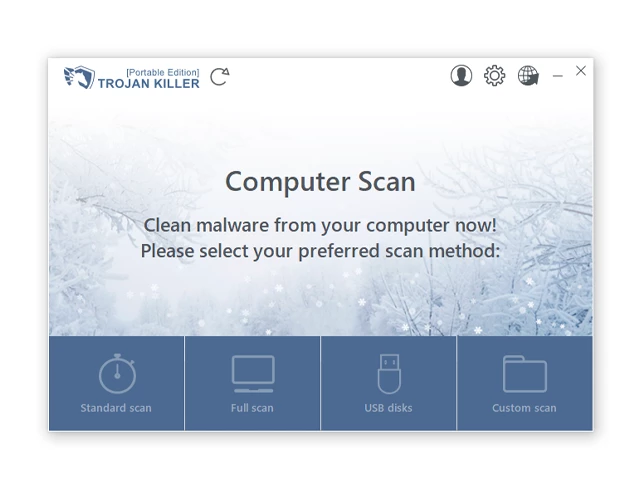
There is a really little number of security tools that are able to be set up on the USB drives, and antiviruses that can do so in most cases require to obtain quite an expensive license. For this instance, I can recommend you to use another solution of GridinSoft - Trojan Killer Portable. It has a 14-days cost-free trial mode that offers the entire features of the paid version. This term will definitely be 100% enough to wipe malware out.
Trojan Killer is a valuable tool in your cybersecurity arsenal, helping you to effectively remove malware from infected computers. Now, we will walk you through the process of using Trojan Killer from a USB flash drive to scan and remove malware on an infected PC. Remember, always obtain permission to scan and remove malware from a computer that you do not own.
Step 1: Download & Install Trojan Killer on a Clean Computer:
1. Go to the official GridinSoft website (gridinsoft.com) and download Trojan Killer to a computer that is not infected.
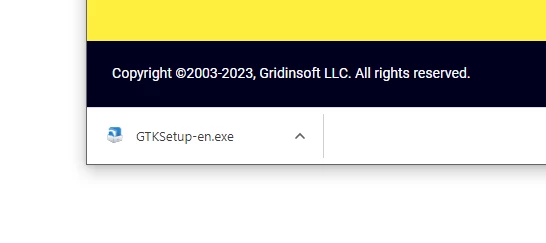
2. Insert a USB flash drive into this computer.
3. Install Trojan Killer to the "removable drive" following the on-screen instructions.
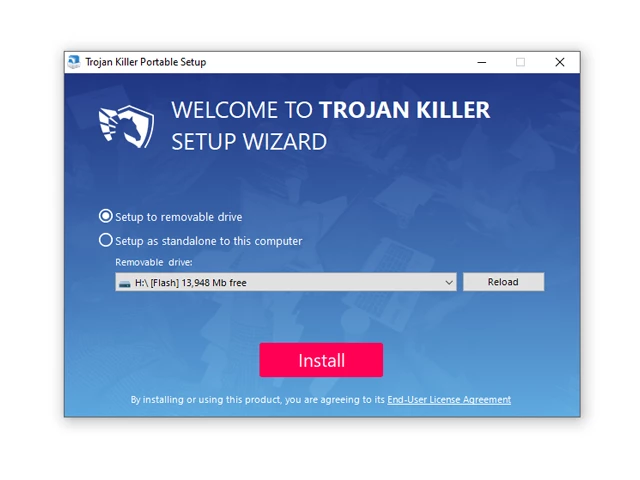
4. Once the installation is complete, launch Trojan Killer.
Step 2: Update Signature Databases:
5. After launching Trojan Killer, ensure that your computer is connected to the Internet.
6. Click "Update" icon to download the latest signature databases, which will ensure the tool can detect the most recent threats.
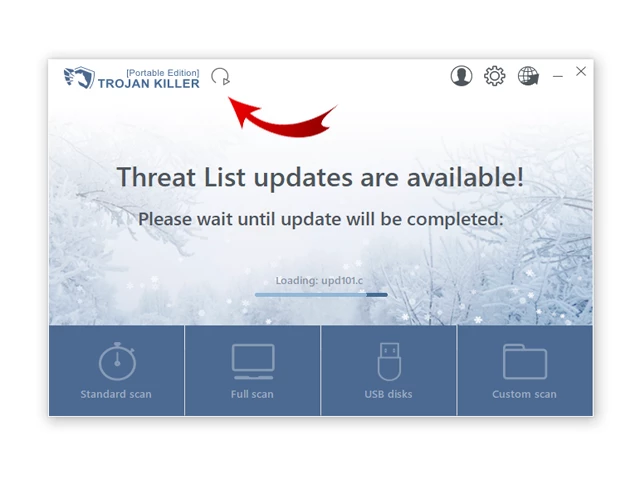
Step 3: Scan the Infected PC:
7. Safely eject the USB flash drive from the clean computer.
8. Boot the infected computer to the Safe Mode.
9. Insert the USB flash drive.
10. Run tk.exe
11. Once the program is open, click on "Full Scan" to begin the malware scanning process.
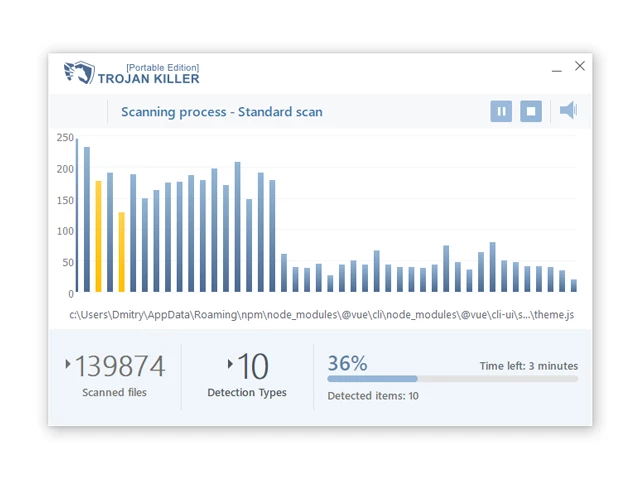
Step 4: Remove Found Threats:
12. After the scan is complete, Trojan Killer will display a list of detected threats.
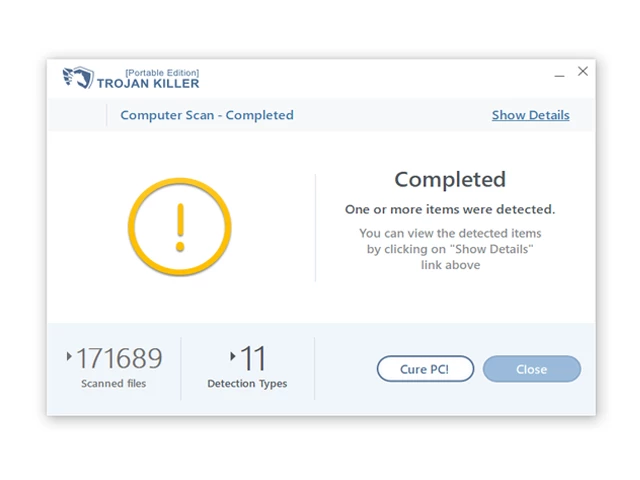
13. Click on "Cure PC!" to remove the identified malware from the infected PC.
14. Follow any additional on-screen prompts to complete the removal process.
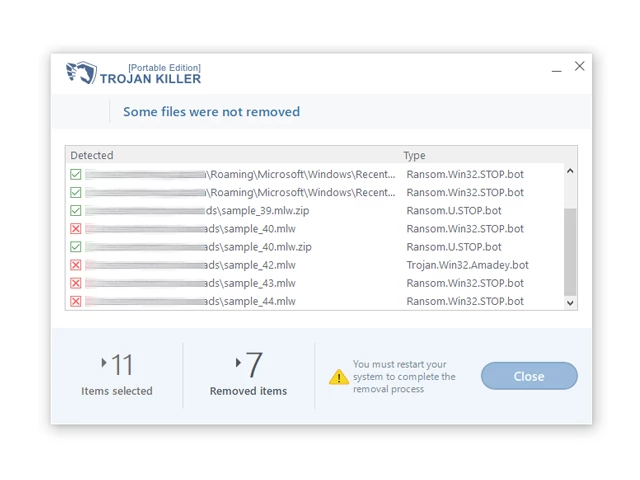
Step 5: Restart Your Computer:
15. Once the threats are removed, click on "Restart PC" to reboot your computer.
16. Remove the USB flash drive from the infected computer.
Congratulations on effectively removing qBit and the concealed threats from your computer! You can now have peace of mind, knowing that they won't resurface again. Thanks to Gridinsoft's capabilities and commitment to cybersecurity, your system is now protected.
Frequently Asked Questions (FAQ)
Reformatting your storage device should only be considered as a last resort for removing qBit malware. Prior to taking such drastic action, it is advisable to perform a comprehensive scan using trustworthy antivirus or anti-malware software.
Malware poses a significant risk to the security and privacy of sensitive information, potentially leading to identity theft, financial loss, and unauthorized access to personal accounts. Furthermore, it can disrupt the normal operation of a system, causing performance issues, system crashes, and data corruption.
The purpose of qBit is to enable remote access and control of compromised devices. It allows threat actors to perform various malicious activities, such as unauthorized access, data theft, system manipulation, and disabling security measures, potentially causing significant harm to individuals and organizations.
Gridinsoft Anti-Malware has the ability to identify and eliminate most malware infections. Nevertheless, it is crucial to recognize that sophisticated malware can remain hidden deep within the system. Consequently, conducting a complete system scan is imperative to detect and eradicate malware.
How to Remove qBit Malware
Name: qBit
Description: qBit, a data-stealing malware, is circulating in underground hacker forums. Written in Go, it evades endpoint threat detection and response systems, efficiently siphoning sensitive data from compromised systems. Its capability to upload stolen information to a location of the attacker's choosing makes it a potent threat. Victims face risks of identity theft, financial loss, and reputational damage due to this stealthy malware's actions. Infections typically occur through email attachments, untrusted downloads, or malicious links, with users often falling prey to social engineering tactics like phishing.
Operating System: Windows
Application Category: Malware

